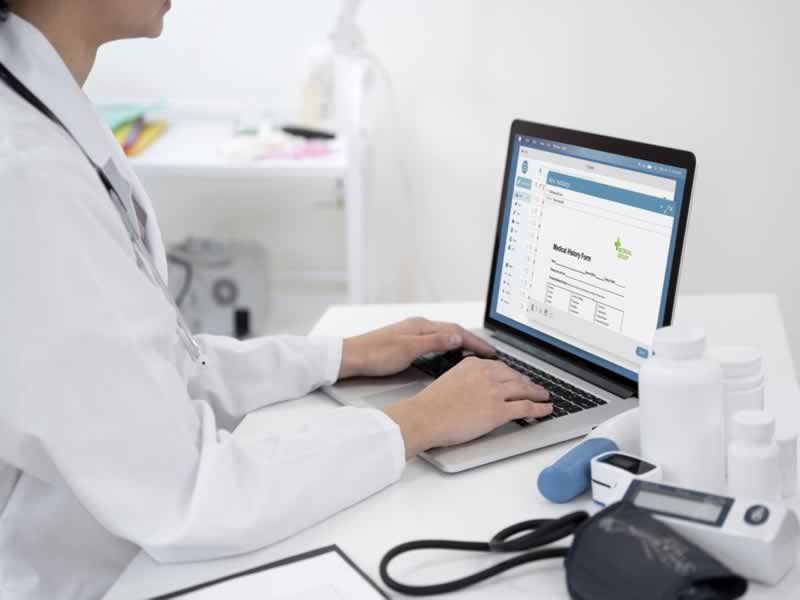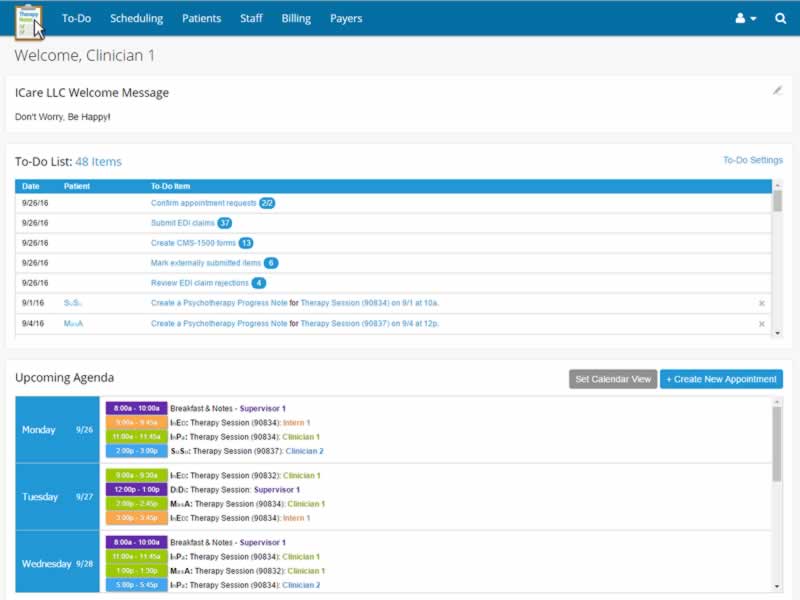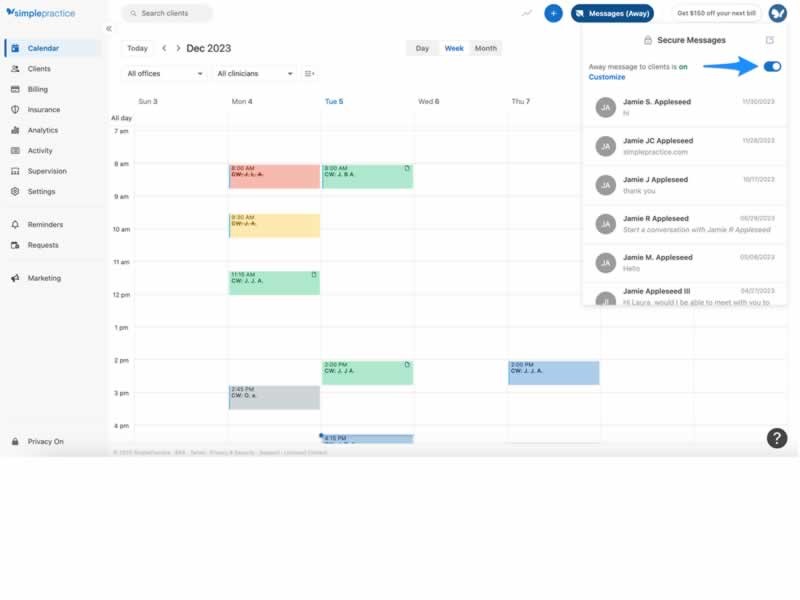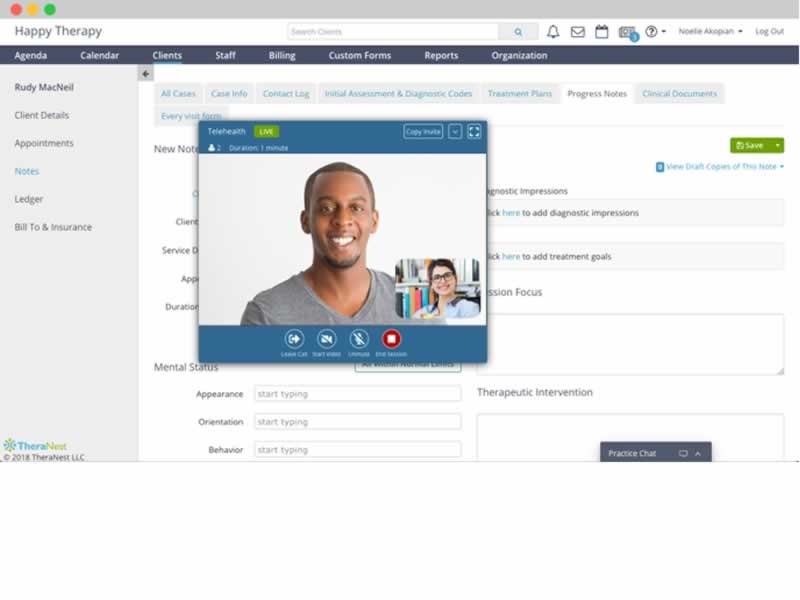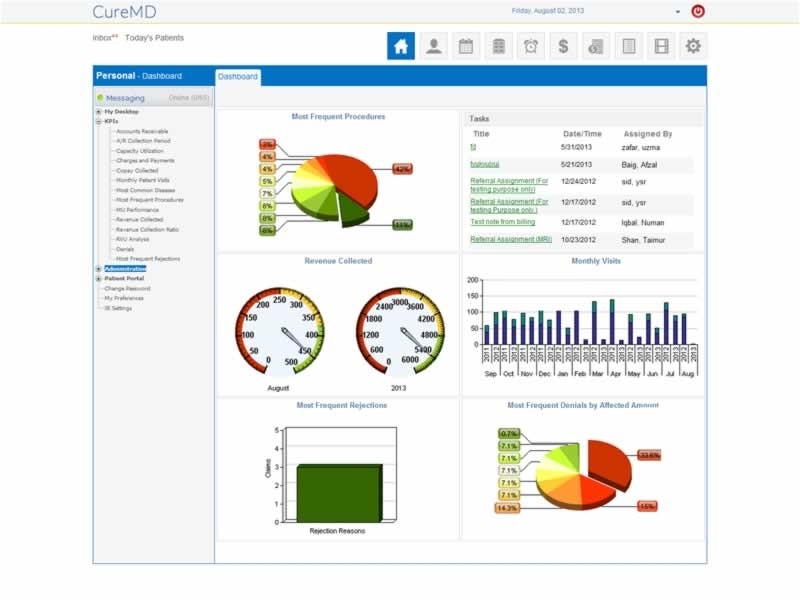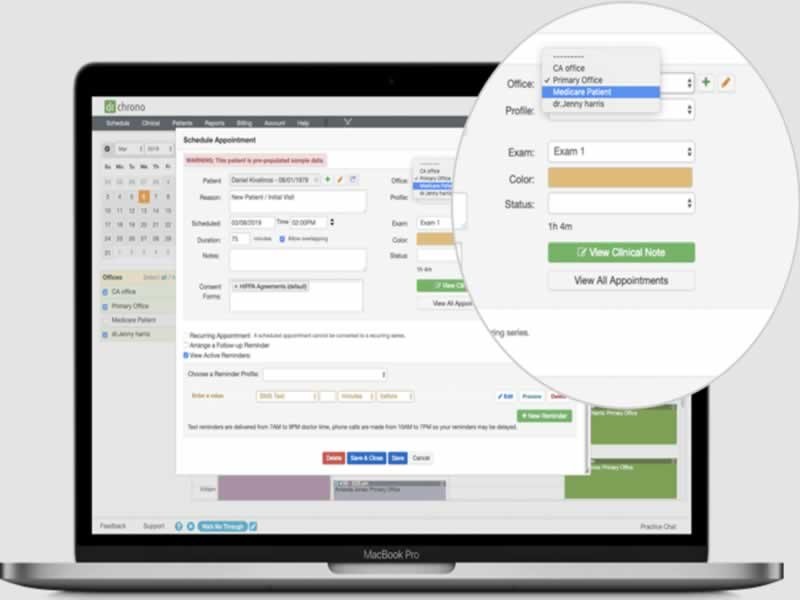Insight Blog
Agility’s perspectives on transforming the employee's experience throughout remote transformation using connected enterprise tools.
18 minutes reading time (3630 words)
Mastering Medical Billing: Top Software Solutions of 2024
Mastering medical billing has never been simpler than with the help of software solutions that optimize the process.
Medical billing software presents an efficient solution for healthcare providers and medical facilities, streamlining billing processes. Choosing the right software tailored to your needs can significantly boost reimbursement rates, optimize revenue generation, and establish a sustainable medical practice.
Market Research Future reports that the medical billing market reached $14.2 billion in 2022 and is projected to grow from $15.88 billion in 2023 to $31.9 billion by 2030, indicating a compound annual growth rate of 11.9% from 2023 to 2030.
But more importantly, according to Grand View Research, the increasing adoption of healthcare claim outsourcing is influenced by emerging trends driven by factors like bad debts, innovative technology solutions, evolving billing practices, and shifting regulatory guidelines.
Leading medical billing software solutions offer a comprehensive view of your practice's performance through reports and analytical insights.
To aid in your decision-making process, the team at Agility Online conducted an extensive review of the most popular medical billing software options available.
First, let us break down what medical billing software is classified as.
What Is Medical Billing Software?
Medical billing software is a pivotal medical technology solution that is revolutionizing medical billing tasks and refining business management procedures. By automating traditionally manual practices like billing and claims management, these tools streamline operations, reduce errors, and enhance efficiency within healthcare settings.
Medical billing software plays a crucial role in simplifying administrative tasks across various healthcare facilities, including clinics, hospitals, and wellness centers. It facilitates the submission of claims and seamless communication with multiple insurance providers, ensuring swift reimbursement processes. Moreover, healthcare providers leverage these software solutions for tasks like payment tracking and patient billing management, enabling them to maintain accurate records and provide transparent billing services to patients.
The versatility of medical billing software extends beyond mere administrative functions.
Advanced features encompassing reporting and analytics empower healthcare practitioners to gain invaluable insights into their financial performance and billing trends. By generating comprehensive reports and analytical data, these software solutions enable informed decision-making, helping healthcare providers optimize revenue streams and identify areas for improvement.
Also, integration with electronic health records (EHR) systems enhances interoperability, fostering seamless data exchange and improving patient care coordination.
What are the Benefits of medical billing software
Medical billing software revolutionizes business management processes by simplifying complex tasks. Through dynamic automation solutions, these programs replace manual practices, reducing employees' time and effort while enhancing overall efficiency.
- One significant benefit of advanced medical billing software is the reduction of errors in claim submissions. Utilizing sophisticated algorithms, these systems ensure that patient claims are error-free before submission, thereby minimizing the risk of claim denials and optimizing revenue streams.
- It's worth mentioning that medical billing software streamlines coding practices, enabling practitioners to receive accurate reimbursements based on information gathered from various sources, such as medical reports and procedures. Emerging AI capabilities enhance efficiency by automating coding and charting practices, facilitating seamless data entry and record-keeping.
- By integrating uniform coding functions with secure patient databases, medical billing software significantly reduces the risk of claim denial, improves revenue, and maintains smooth healthcare management operations. Additionally, understanding the multiple features of an EHR billing software can further enhance this streamlining process by combining patient records and financial data into one efficient system. Secure integration techniques ensure proper administration compliance with federal guidelines while minimizing errors in data entry. Beyond software features, understanding the role for medical billing and coding specialists in patient care helps optimize workflows, reduce errors, and strengthen interdisciplinary coordination.
- Automation lies at the core of medical billing software, optimizing operational efficiencies by automating bill claims and reimbursement procedures. These systems also handle follow-up claims, providing timely alerts and notifications to healthcare vendors while ensuring built-in eligibility verifications for frictionless payments and reimbursements.
- Ensuring data security is paramount in healthcare settings, and automated medical billing software meets this need by securely maintaining electronic health records (EHR) in real-time. Compliant with federal regulations and HIPAA guidelines, these programs safeguard sensitive patient information, minimizing legal liabilities.
- Integrated with EHR systems, effective billing systems offer secure one-stop databases for all healthcare management needs. Cloud-based solutions add an extra layer of security with encryption capabilities, eliminating data gaps and expediting claims and reimbursements while ensuring accessibility and confidentiality.
- Medical billing software allows healthcare practitioners to integrate with multiple payment processors, offering patients flexible settlement options. Mobile-friendly patient portals with user-friendly interfaces streamline the settlement process, enhancing patient experiences and making healthcare more accessible and affordable.
How to pick a Medical Billing Software for your business
Selecting the right medical billing software is vital for the efficiency and here's a guide to help you choose the best option:
- Define Your Needs: Start by understanding your business requirements. Consider factors such as the size of your practice, the volume of patients you handle, and the complexity of your billing processes. This will help you narrow your options and focus on software solutions that suit your needs.
- Features and Functionality: Look for software that offers comprehensive features to manage all aspects of medical billing, including claims submission, coding, patient invoicing, and payment processing. Ensure the software integrates seamlessly with your existing systems, such as electronic health records (EHR), to streamline workflows.
- Ease of Use: Choose a user-friendly interface that is intuitive and easy to navigate. Your staff should be able to learn how to use the software quickly with minimal training. Customizable templates and workflows can further simplify your billing processes.
- Compliance and Security: Prioritize software that complies with industry regulations, such as HIPAA, to protect patient data and maintain confidentiality. Look for features like encryption, access controls, and audit trails to enhance data security.
- Integration Capabilities: Select software that can integrate smoothly with other systems and third-party applications used in your business. Integration with EHR systems, practice management software, and payment gateways can improve efficiency and streamline workflows.
- Scalability and Flexibility: Choose a software solution that can grow with your business. Look for flexible pricing plans and scalability options that allow you to add or remove features as needed. Cloud-based solutions offer scalability and accessibility from anywhere with an internet connection.
- Customer Support and Training: Evaluate the level of customer support and training the software vendor provides. Look for vendors that offer comprehensive training resources, tutorials, and responsive customer support to assist you with any issues or questions.
- Cost Considerations: Consider the cost of the software, including upfront fees, subscription plans, and any additional charges for add-on features or support services. Choose a software solution that offers the best value for your investment while staying within your budget.
By considering these factors and conducting thorough research, you can select a medical billing software that meets your business needs and helps you streamline your billing processes effectively.
Follow us and access great exclusive content everyday: Follow us on Google News
Presenting our selection of the Best Medical Billing Software for 2024
Medical billing software can be quite a chore, especially if you're trying to find the perfect fit for your practice.
Whether you're a small clinic or a large hospital, the efficiency of your billing operations hinges significantly on the software you choose. Let's break down some of the top players in the game, each known for its robust features and reliability.
#1.TherapyNotes
TherapyNotes offers a comprehensive suite of features designed to streamline practice management for mental health professionals. Some key features include:
- Electronic Health Records (EHR): TherapyNotes provides customizable electronic health records tailored specifically for mental health practices. This feature allows practitioners to efficiently manage client records, treatment plans, and progress notes.
- Appointment Scheduling: The platform includes a user-friendly appointment scheduling system that enables practitioners to manage their calendars, schedule appointments, and send automated reminders to clients.
- Billing and Invoicing: TherapyNotes simplifies billing processes with its integrated billing and invoicing capabilities. Practitioners can generate invoices, submit insurance claims electronically, and track payments effortlessly.
- Telehealth: In response to the growing demand for telehealth services, TherapyNotes offers built-in telehealth functionality, allowing practitioners to conduct secure video sessions with clients remotely.
- Practice Management Tools: The software includes various practice management tools such as task management, document storage, and secure messaging to enhance operational efficiency and communication within the practice.
TherapyNotes Pricing
For Practice, Clinic, Hospital, Center, or Facility: First clinician - $59/month Additional clinicians - $30/month Interns - $20/month For Non-Profit US Organization: $25/month per clinician 14 cents each for electronic claims 14 cents each for text & phone reminders Free email reminders
Pros of TherapyNotes:
- User-Friendly Interface: TherapyNotes features an intuitive and easy-to-navigate interface, making it accessible for practitioners of all levels of technical proficiency.
- Comprehensive Features: The software provides a comprehensive set of features covering various aspects of practice management, from EHR and scheduling to billing and telehealth.
- HIPAA Compliance: TherapyNotes prioritizes data security and compliance with HIPAA regulations, ensuring that sensitive patient information is protected at all times.
- Excellent Customer Support: The platform offers responsive customer support to assist users with any questions or technical issues they may encounter.
You may also like: Best Apps for Employees: UPDATED 2022 – A Complete Guide
Cons of TherapyNotes
- Limited Customization: While TherapyNotes offers some degree of customization, some users may find the platform's customization options to be somewhat limited compared to other solutions.
- Learning Curve: Despite its user-friendly interface, new users may experience a learning curve when initially navigating the platform and familiarizing themselves with its features.
- Integration Limitations: TherapyNotes may have limitations in terms of integrating with other third-party software and platforms, which could be a drawback for practices requiring extensive integration capabilities.
#2.SimplePractice
SimplePractice is a versatile practice management platform tailored specifically for mental health professionals. It offers a wide range of features to streamline administrative tasks and enhance client care, including:
- Electronic Health Records (EHR): SimplePractice provides customizable EHR templates designed to meet the unique needs of mental health practitioners. This feature enables clinicians to efficiently document client sessions, treatment plans, and progress notes.
- Appointment Scheduling: The platform includes a user-friendly scheduling tool that allows practitioners to manage appointments, set availability, and send automated reminders to clients via email or SMS.
- Billing and Invoicing: SimplePractice simplifies billing processes with its integrated billing and invoicing capabilities. Practitioners can create and send invoices, process payments securely, and submit insurance claims electronically.
- Telehealth: In response to the growing demand for telehealth services, SimplePractice offers a built-in telehealth solution that allows practitioners to conduct secure video sessions with clients from anywhere.
- Client Portal: SimplePractice features a client portal where clients can securely access forms, documents, and appointment information. This portal enhances communication between practitioners and clients and allows for seamless collaboration.
SimplePractice Pricing
- SimplePractice offers three plans, the Start Plan for $29 per month, the Essential Plan starting at $69 per month and the Plus Plan starting at $99 per month.
- Visit simplepractice.com/pricing to see what features are available in each plan.
Pros of SimplePractice
- Intuitive Interface: SimplePractice boasts an intuitive and user-friendly interface, making it accessible for practitioners of all skill levels.
- Comprehensive Features: The platform offers a comprehensive suite of features covering various aspects of practice management, from EHR and scheduling to billing and telehealth.
- Customization Options: SimplePractice provides extensive customization options, allowing practitioners to tailor the platform to suit their individual workflows and preferences.
- Excellent Customer Support: SimplePractice offers responsive customer support via phone, email, and live chat to assist users with any questions or technical issues they may encounter.
Cons of SimplePractice
- Integration Challenges: While SimplePractice integrates with many third-party applications, some users may encounter challenges when attempting to integrate with specific software or platforms.
- Limited Reporting Capabilities: Some users have reported limitations in the platform's reporting capabilities, particularly in terms of generating custom reports and accessing advanced analytics.
- Learning Curve: Despite its intuitive interface, new users may experience a learning curve when first navigating the platform and familiarizing themselves with its features and functionalities.
Free ebook: How To Get Your Intranet Off The Ground
#3.TheraNest
TheraNest is a comprehensive practice management solution designed specifically for mental health professionals. It offers a range of features to streamline administrative tasks and improve client care, including:
- Electronic Health Records (EHR): TheraNest provides customizable EHR templates tailored to the needs of mental health practitioners. Clinicians can efficiently document client sessions, treatment plans, and progress notes, ensuring comprehensive and accurate record-keeping.
- Appointment Scheduling: The platform includes a user-friendly scheduling tool that allows practitioners to manage appointments, set availability, and send automated reminders to clients. Flexible scheduling options cater to individual preferences and ensure efficient time management.
- Billing and Invoicing: TheraNest simplifies billing processes with its integrated billing and invoicing capabilities. Practitioners can create and send invoices, process payments securely, and submit insurance claims electronically, reducing administrative burdens and optimizing revenue streams.
- Telehealth: TheraNest offers a built-in telehealth solution that allows practitioners to conduct secure video sessions with clients remotely. This feature enables practitioners to provide continuity of care and reach clients in remote or underserved areas.
- Client Portal: TheraNest features a client portal where clients can securely access forms, documents, and appointment information. This portal enhances communication between practitioners and clients, facilitates collaboration, and promotes client engagement.
TheraNest Pricing
- The product pricing varies according to the number of active clients. 30 Active Clients Plan - $39.00/mo 40 Active Clients Plan - $50.00/mo 50 Active Clients Plan - $60.00/mo 80 Active Clients Plan - $91.00/mo 100 active clients or more will need to contact sales
Pros of TheraNest
- Intuitive Interface: TheraNest boasts an intuitive and user-friendly interface, making it accessible for practitioners of all skill levels. The platform's clean design and straightforward navigation enhance user experience and promote efficient workflow management.
- Comprehensive Features: TheraNest provides a comprehensive suite of features covering various aspects of practice management, from EHR and scheduling to billing and telehealth. Practitioners can access all necessary tools within a single platform, minimizing the need for multiple software solutions.
- HIPAA Compliance: TheraNest prioritizes data security and compliance with HIPAA regulations, ensuring that sensitive client information is protected at all times. Robust security measures and encryption protocols safeguard data integrity and confidentiality.
- Responsive Customer Support: TheraNest offers responsive customer support via phone, email, and live chat to assist users with any questions or technical issues they may encounter. Knowledgeable support staff provide timely assistance and ensure a positive user experience.
Cons of TheraNest
- Limited Customization: Some users may find TheraNest's customization options to be somewhat limited compared to other practice management platforms. While the platform offers basic customization features, more advanced customization capabilities may be lacking.
- Integration Challenges: TheraNest may have limitations in terms of integrating with certain third-party applications or software platforms. Users may encounter challenges when attempting to integrate TheraNest with other tools or systems used in their practices.
- Learning Curve: Despite its intuitive interface, new users may experience a learning curve when first navigating TheraNest and familiarizing themselves with its features and functionalities. Comprehensive training resources and support documentation can help users overcome initial challenges and optimize their use of the platform.
#4.CureMD
CureMD is a comprehensive healthcare practice management solution that offers a range of features to streamline administrative tasks and improve patient care, including:
- Electronic Health Records (EHR): CureMD provides customizable EHR templates designed to meet the unique needs of healthcare practitioners. Clinicians can efficiently document patient encounters, treatment plans, and medical histories, ensuring accurate and comprehensive record-keeping.
- Appointment Scheduling: The platform includes an intuitive appointment scheduling tool that allows practitioners to manage appointments, set availability, and send reminders to patients. Advanced scheduling options cater to individual preferences and ensure efficient time management.
- Billing and Invoicing: CureMD simplifies billing processes with its integrated billing and invoicing capabilities. Practitioners can create and send invoices, process payments securely, and submit insurance claims electronically, reducing administrative burdens and optimizing revenue cycles.
- Telemedicine: CureMD offers telemedicine functionality that enables practitioners to conduct secure video consultations with patients remotely. This feature facilitates continuity of care, improves access to healthcare services, and enhances patient engagement.
- Practice Analytics: CureMD provides robust practice analytics tools that enable practitioners to track key performance metrics, identify trends, and make data-driven decisions. Advanced reporting capabilities help practices optimize workflows, improve patient outcomes, and maximize profitability.
CureMD pricing
- For practice management (PM): $195/month/provider For electronic health records (EHR): $295/month/provider For all-in-one (PM + EHR): $395/month/provider For billing services: 4% of collections EHR Cloud - Starting at $295/month
Pros of CureMD
- Comprehensive Features: CureMD provides a comprehensive suite of features covering various aspects of practice management, from EHR and scheduling to billing and telemedicine. Practitioners can access all necessary tools within a single platform, reducing the need for multiple software solutions.
- Customization Options: CureMD offers extensive customization options, allowing practitioners to tailor the platform to suit their individual workflows and preferences. Customizable templates, workflows, and reports enable practices to optimize efficiency and effectiveness.
- HIPAA Compliance: CureMD prioritizes data security and compliance with HIPAA regulations, ensuring that patient information is protected at all times. Robust security measures and encryption protocols safeguard data integrity and confidentiality.
- Responsive Customer Support: CureMD offers responsive customer support via phone, email, and live chat to assist users with any questions or technical issues they may encounter. Knowledgeable support staff provide timely assistance and ensure a positive user experience.
Cons of CureMD
- Learning Curve: Despite its comprehensive features and intuitive interface, new users may experience a learning curve when first navigating CureMD and familiarizing themselves with its functionalities. Comprehensive training resources and support documentation can help users overcome initial challenges and optimize their use of the platform.
- Integration Challenges: CureMD may have limitations in terms of integrating with certain third-party applications or software platforms. Users may encounter challenges when attempting to integrate CureMD with other tools or systems used in their practices.
#5.DrChrono
DrChrono is a comprehensive healthcare practice management solution designed to modernize and streamline administrative tasks while enhancing patient care. Key features of DrChrono include:
- Electronic Health Records (EHR): DrChrono offers customizable EHR templates tailored to the needs of healthcare practitioners. Clinicians can efficiently document patient encounters, treatment plans, and medical histories, ensuring accurate and comprehensive record-keeping.
- Appointment Scheduling: The platform includes an intuitive appointment scheduling tool that allows practitioners to manage appointments, set availability, and send reminders to patients. Advanced scheduling options accommodate individual preferences and promote efficient time management.
- Billing and Invoicing: DrChrono simplifies billing processes with its integrated billing and invoicing capabilities. Practitioners can create and send invoices, process payments securely, and submit insurance claims electronically, reducing administrative burdens and optimizing revenue cycles.
- Telemedicine: DrChrono offers telemedicine functionality that enables practitioners to conduct secure video consultations with patients remotely. This feature facilitates continuity of care, improves access to healthcare services, and enhances patient engagement.
- Mobile Access: DrChrono provides mobile access to its platform, allowing practitioners to manage appointments, access patient records, and complete administrative tasks from any device. The mobile app enables flexibility and convenience, empowering practitioners to stay connected and productive on the go.
DrChrono Pricing
- DrChrono offers transparent pricing plans tailored to the needs of healthcare practitioners. Pricing is based on a subscription model, with options available for solo practitioners as well as group practices. While exact pricing may vary based on specific requirements and customization options, DrChrono typically offers competitive pricing compared to similar platforms in the market.
Pros of DrChrono
- Comprehensive Features: DrChrono provides a comprehensive suite of features covering various aspects of practice management, from EHR and scheduling to billing and telemedicine. Practitioners can access all necessary tools within a single platform, minimizing the need for multiple software solutions.
- Mobile Access: The availability of a mobile app allows practitioners to manage their practices from anywhere, enhancing flexibility and productivity. Mobile access enables practitioners to stay connected and responsive, even when away from the office.
- User-Friendly Interface: DrChrono boasts an intuitive and user-friendly interface, making it accessible for practitioners of all skill levels. The platform's clean design and straightforward navigation enhance user experience and promote efficient workflow management.
- Integration Capabilities: DrChrono integrates seamlessly with a wide range of third-party applications and software platforms, allowing practitioners to customize their workflows and optimize efficiency. Integration with other tools and systems enhances interoperability and streamlines workflows.
Cons of DrChrono
- Learning Curve: Despite its intuitive interface, new users may experience a learning curve when first navigating DrChrono and familiarizing themselves with its functionalities. Comprehensive training resources and support documentation can help users overcome initial challenges and optimize their use of the platform.
- Customization Limitations: Some users may find DrChrono's customization options to be somewhat limited compared to other practice management platforms. While the platform offers basic customization features, more advanced customization capabilities may be lacking.
Wrapping up
Selecting the most suitable medical billing software, including options like medspa software, requires assessing your specific requirements and comparing them to the features provided by these platforms.
Each of these options comes with its own set of strengths, whether it's enhanced support for mental health professionals, mobile accessibility, or comprehensive practice management features. Your choice will ultimately hinge on your practice's size, specialty, and the specific challenges you face in medical billing.
Remember, the right software does more than just send out bills and process payments. It improves the overall patient experience, ensures compliance with ever-changing healthcare regulations, and enhances the operational efficiency of your practice. The best fit for you should align seamlessly with your workflow, enhance your service delivery, and, importantly, make life easier for both your staff and your patients.
Categories
Blog (2676)
Business Management (328)
Employee Engagement (213)
Digital Transformation (179)
Growth (122)
Intranets (120)
Remote Work (61)
Sales (48)
Collaboration (40)
Culture (29)
Project management (29)
Customer Experience (26)
Knowledge Management (21)
Leadership (20)
Comparisons (7)
News (1)
Ready to learn more? 👍
One platform to optimize, manage and track all of your teams. Your new digital workplace is a click away. 🚀
Free for 14 days, no credit card required.

